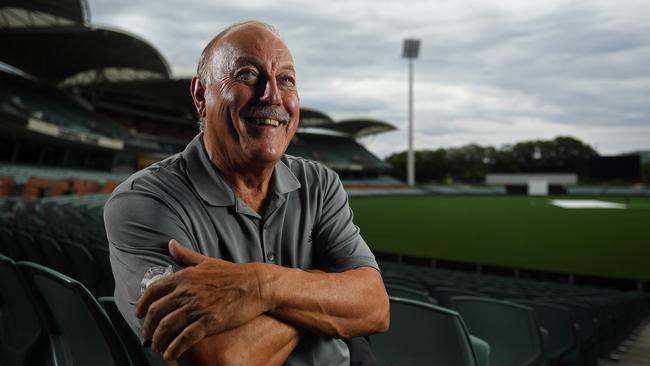Malcolm Blight says coaches not to blame for low-scoring AFL season
Malcolm Blight has defended coaches against allegations they are to blame for one of the lowest scoring seasons in decades.

Malcolm Blight has defended the AFL’s coaches against allegations they are to blame for the negativity created by one of the lowest scoring seasons in decades.
The dual-premiership coach took a highly-attacking Geelong team to three grand finals in the mid-1990s before leading Adelaide to back-to-back premierships in 1997 and 1998.
Blight’s aim with the high-scoring Cats was to kick one more goal than their rivals, with Gary Ablett Sr leading the attack.
But an average score of 79 points per team this year has sparked significant discussion about the health of the game. There has been heavy criticism of the skill level of players and goal-kicking accuracy, while the congestion around the football has fuelled plenty of angst.
But Blight said it was not necessarily the fault of the coaches that a premium is now placed on defensive factors.
“I don’t really blame the coaches,” he said. “The coaches have gone that way and the players I guess, being bagged a bit about their skills — it’s pretty hard when you’ve got 20 blokes around a ball to execute anything except tackles. I’m a bit with the coaches and players on this.”
This will please AFL Coaches Association chief executive Mark Brayshaw, who has staunchly defended the organisation’s members this week.
While North Melbourne coach Brad Scott said the “state of the game” has become an annual topic of debate, there are no doubt various parties riled by how football is being played this year.
A suggestion from Scott’s brother Chris, the Geelong coach, that critics were former players looking at the game through “rose-coloured glasses” angered former Melbourne champion Garry Lyon.
Various ideas have been put forward as possible solutions to make the game more free-flowing. Starting players in zones has been proposed as an idea to stop congestion, while there are various thoughts about the impact of reducing or increasing interchange rotations. Others have suggested reducing the number of players on the field. But recently-retired St Kilda champion Nick Riewoldt is among those aghast at the push for change.
Part of a forum on Fox Footy’s AFL 360, Riewoldt said it was important to respect the history of the game.
He believes the introduction of Greater Western Sydney and the Gold Coast has diluted talent and blamed a dip in skill level in part on recruiters seeking to draft and educate athletes as opposed to natural footballers.
“I don’t have the answers but I think it is a bit of a perfect storm,” Riewoldt said.
“I know the players are as good as they have ever been but the reason I don’t think the teams are as good as they have ever been is that we have had a real dilution of talent across the competition.
“It is not just the congestion. It is the actual skills. I am not so sure we are necessarily recruiting footballers and placing a premium on football talent anymore. If you are a great athlete, I think you are going to get a look in.”
Brad Scott, who is a member of the AFL’s newly-formed competition committee, said it was important to weigh up the possible ramifications of rule modifications before instituting change.
Blight said the league had proven itself capable of making changes that would increase scoring. He noted the last time scoring was as low as this season was in 1968. The following year, a rule penalising kicking the football out of bounds on the full was introduced.
“I started without that system and you could just kick it over the line if you were under pressure,” he told SEN 1116.
“It changed scoring. It changed the game. It is up to the lawmakers and all the coaches and players to adapt and they always will.”




To join the conversation, please log in. Don't have an account? Register
Join the conversation, you are commenting as Logout